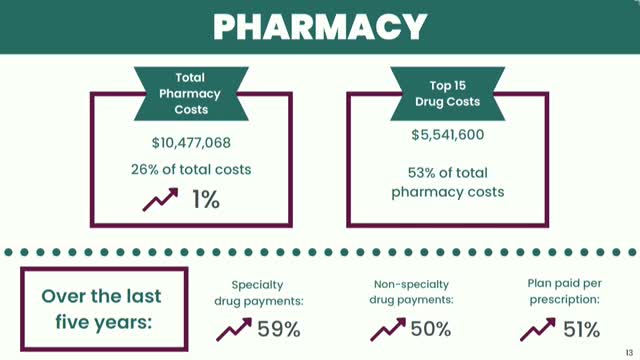Health Plan Adjusts Drug Coverage Following Humira Patent Expiration and Rising Diabetes Costs
August 04, 2025 | Collin County, Texas
This article was created by AI summarizing key points discussed. AI makes mistakes, so for full details and context, please refer to the video of the full meeting. Please report any errors so we can fix them. Report an error »

Collin County officials are grappling with rising pharmacy costs as they prepare for the FY 2026 budget, with a particular focus on the increasing use of diabetes medications. During a recent budget workshop, it was revealed that diabetes drugs have overtaken specialty medications as the top category of expenses for the first time, largely due to a surge in users of GLP-1 medications.
The discussion highlighted a significant shift in the drug landscape, particularly with the recent patent expiration of Humira, which has historically been one of the county's most expensive medications. With Humira now off patent, its usage has declined, making way for other drugs that are more cost-effective. However, the approval of 24 new high-cost biologics by the FDA in 2024 raises concerns about future expenses, as similar approvals are expected in 2025.
Officials noted that while employees currently pay only 7% of their prescription costs due to maximum caps on their plans, the overall pharmacy costs have increased by over $2.6 million in the past five years. The rising costs are attributed to the growing number of users of GLP-1 drugs, which are significantly more expensive than traditional diabetes medications like Metformin.
The county is also facing challenges related to tariffs on imported drugs, which could further inflate prices. A 15% tariff increase on drugs from the European Union is anticipated, affecting medications such as Ozempic and Keytruda. This situation complicates efforts to manage costs effectively.
In response to these challenges, officials are exploring options to encourage the use of lower-cost alternatives and are considering implementing step therapy protocols for new patients. This would require patients to try generic or lower-cost options before being prescribed more expensive medications. However, the complexities of drug pricing and insurance negotiations pose significant hurdles.
As the county moves forward with its budget planning, the discussions underscore the need for strategic approaches to manage rising healthcare costs while ensuring that residents have access to necessary medications. The implications of these decisions will be closely monitored as they unfold in the coming fiscal year.
The discussion highlighted a significant shift in the drug landscape, particularly with the recent patent expiration of Humira, which has historically been one of the county's most expensive medications. With Humira now off patent, its usage has declined, making way for other drugs that are more cost-effective. However, the approval of 24 new high-cost biologics by the FDA in 2024 raises concerns about future expenses, as similar approvals are expected in 2025.
Officials noted that while employees currently pay only 7% of their prescription costs due to maximum caps on their plans, the overall pharmacy costs have increased by over $2.6 million in the past five years. The rising costs are attributed to the growing number of users of GLP-1 drugs, which are significantly more expensive than traditional diabetes medications like Metformin.
The county is also facing challenges related to tariffs on imported drugs, which could further inflate prices. A 15% tariff increase on drugs from the European Union is anticipated, affecting medications such as Ozempic and Keytruda. This situation complicates efforts to manage costs effectively.
In response to these challenges, officials are exploring options to encourage the use of lower-cost alternatives and are considering implementing step therapy protocols for new patients. This would require patients to try generic or lower-cost options before being prescribed more expensive medications. However, the complexities of drug pricing and insurance negotiations pose significant hurdles.
As the county moves forward with its budget planning, the discussions underscore the need for strategic approaches to manage rising healthcare costs while ensuring that residents have access to necessary medications. The implications of these decisions will be closely monitored as they unfold in the coming fiscal year.
View full meeting
This article is based on a recent meeting—watch the full video and explore the complete transcript for deeper insights into the discussion.
View full meeting
